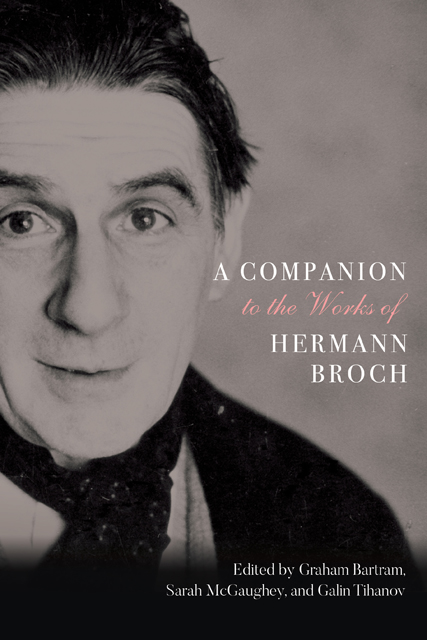Book contents
- Frontmatter
- Contents
- Preface
- Acknowledgments
- List of Abbreviations
- Introduction: Broch’s Life and Works
- 1 Perspectives on Broch’s Die Schlafwandler: Narratives of History and the Self
- 2 Hermann Broch and the Dilemma of Literature in the Modern Age
- 3 Interrogating Modernity: Hermann Broch’s Postromanticism
- 4 Broch and the Theater: Die Entsühnung and Aus der Luft gegriffen as Tragic and Comic Dramatizations of the Economic Machine
- 5 Limits of the Scientific: Broch’s Die Unbekannte Größe
- 6 Broch’s Die Verzauberung: Ludwig Klages and the Bourgeois Mitläufer
- 7 Hermann Broch’s Massenwahnprojekt and Its Relevance for Our Times
- 8 Human Rights and the Intellectual’s Ethical Duty: Broch’s Political Writings
- 9 Broch’s Der Tod des Vergil: Art and Power, Language and the Ineffable
- 10 From the “Tierkreis-Erzählungen” to Die Schuldlosen: The Creation of Broch’s Last Novel
- 11 Broch’s Legacy and Resonance
- Selected Bibliography
- Notes on the Contributors
- Index
6 - Broch’s Die Verzauberung: Ludwig Klages and the Bourgeois Mitläufer
Published online by Cambridge University Press: 20 January 2023
- Frontmatter
- Contents
- Preface
- Acknowledgments
- List of Abbreviations
- Introduction: Broch’s Life and Works
- 1 Perspectives on Broch’s Die Schlafwandler: Narratives of History and the Self
- 2 Hermann Broch and the Dilemma of Literature in the Modern Age
- 3 Interrogating Modernity: Hermann Broch’s Postromanticism
- 4 Broch and the Theater: Die Entsühnung and Aus der Luft gegriffen as Tragic and Comic Dramatizations of the Economic Machine
- 5 Limits of the Scientific: Broch’s Die Unbekannte Größe
- 6 Broch’s Die Verzauberung: Ludwig Klages and the Bourgeois Mitläufer
- 7 Hermann Broch’s Massenwahnprojekt and Its Relevance for Our Times
- 8 Human Rights and the Intellectual’s Ethical Duty: Broch’s Political Writings
- 9 Broch’s Der Tod des Vergil: Art and Power, Language and the Ineffable
- 10 From the “Tierkreis-Erzählungen” to Die Schuldlosen: The Creation of Broch’s Last Novel
- 11 Broch’s Legacy and Resonance
- Selected Bibliography
- Notes on the Contributors
- Index
Summary
As a perceptive observer of the political scene in Germany, Broch watched as in the years 1933–36 even the educated middle class succumbed to the primitive slogans of National Socialism. This was the social stratum for and about which he wrote the so-called first version—the only completed one—of his novel Die Verzauberung,the bulk of which was composed during the second half of 1935.The character and psychological makeup of the narrator provide a paradigmatic example of the middle class’s turn toward the stance of the Mitläufer or “bystander”—a more or less passive acceptance of National Socialism.
The figure of the Mitläufer gives the novel a relevance beyond the immediate historical context, for the tendency to tacitly go along with majority opinion is not tied to a particular era; it simply presents itself in different historical forms.In Broch’s text the process of human degradation takes place under the influence of Ludwig Klages,who felt so close to National Socialism that he declared among friends that he had provided its “metaphysical foundations.”It is generally agreed that Klages helped pave the way for Hitler among the educated middle class: in the years before the First World War he was already a darling of upper-middle-class society; it is hard to exaggerate the influence of his vitalist philosophy and characterology (subsequently taught in university courses) on the broad reading public. In the mid-1930s his influence reached its peak:the combination of biologistic thought, explicit anti-Semitism, critique of Christianity and capitalism, and the notion of salvation through violence and sacrifice found its political analogue in the doctrines of National Socialism. Some of his prominent supporters therefore demanded that “Klages’s teachings be made the core of the National Socialist worldview”; others longed for the “introduction of a pagan religiosity in Germany” based on his ideas. In April 1936, however, Nazi cultural spokesmen began to attack Klages for his critique of the principle of the Will and of scientific thought, alleging that his writings were irreconcilable with the basic tenets of National Socialism.
In Broch’s Verzauberung Klages’s cultural critique serves as a banalized intellectual substratum in order to show a mountain village being brought under the ideological sway of the demagogic itinerant prophet Marius Ratti. The central character used to demonstrate this process is the narrator, the village doctor.
- Type
- Chapter
- Information
- A Companion to the Works of Hermann Broch , pp. 123 - 142Publisher: Boydell & BrewerPrint publication year: 2019



